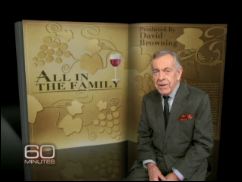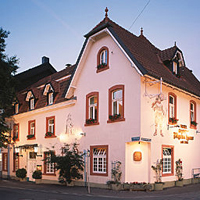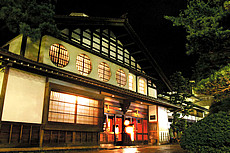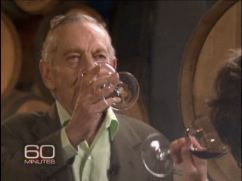CBS’s 60 Minutes is more than just the longest-running prime-time TV series in any genre, having aired continuously for forty years, since 1968. It’s one of the most renowned and esteemed investigative news programs in the business. They work to get the facts, and to get them accurate, as the flop sweat from those unfortunate enough to get interrogated by these vets has repeatedly proven.
 So, last night, when Morley Safer, one of the show’s foundational journalists, opined sanguinely, calling Florence, Italy-based vintner Marchesi Antinori Srl “perhaps the oldest family business on earth,” I didn’t even blink.
So, last night, when Morley Safer, one of the show’s foundational journalists, opined sanguinely, calling Florence, Italy-based vintner Marchesi Antinori Srl “perhaps the oldest family business on earth,” I didn’t even blink.
It’s 60 Minutes! Heck, Antinori has been under the same management since 1385. Literally since the Renaissance was brand new. Half a century-plus before Leonardo da Vinci was born.
Then, I did some research. According to my sources, Marchesi Antinori Srl has been up-and-running 623 years, true.
But it’s not “the oldest family business on earth,” or even in Italy. It’s not even the oldest family vintner in Italy. Nor is it the third-, or even the fourth-oldest such business in the world. Not even close.
It’s the ninth.
According to FamilyBusiness.com, which, as its name may suggest, has a vital interest in this subject and, to which Safer’s staff could have easily availed themselves with a simple Google search, family-owned firms that have been taking the public’s loot longer than Antinori include:
8. Torrini Firenze, Italy, goldsmith. Their web site displays the company’s 2007 collection. So what if you’re a year out of date when you’ve been around since 1369?
7. Richard de Bas, France, papermaker. “The company produces only 200 to 300 sheets per day.” They’re the people that firms which print limited-edition Braques and Picassos have gone to for dead trees since 1326.
 6. Hotel Pilgrim Haus, right, Germany, innkeeper. Don’t be a wise guy and call up their lost & found, saying you left something behind in your room during the 1200s, though, because they’ve only been open since 1304, and they’ll peg you on it.
6. Hotel Pilgrim Haus, right, Germany, innkeeper. Don’t be a wise guy and call up their lost & found, saying you left something behind in your room during the 1200s, though, because they’ve only been open since 1304, and they’ll peg you on it.
5. Barovier & Toso, Italy, glass. “The Barovier family produces crystalline glass, mother-of-pearl glass and gold-free cornelian red on Murano Island, about a ten-minute ferry ride from Venice.” Get outta here. 1295.
4. Barone Ricasoli, Italy, wine. C’mon, Morley: They’ve been making wine more than 240 years before Antinori, in the same country, starting in 1141! What do you pay your fact-checkers: Rooney’s one-liners? That’s like if someone was doing an investigative news TV show before the signing of the Declaration of Independence, then 60 Minutes came along and said they were first! Keep it real, dawg!
2 and 3. (tie) Château de Goulaine, France, vineyard; and Pontificia Fonderia Marinelli, Italy, bell foundry; both operating since 1000.
And, finally, the real oldest family-owned business in the world:
 1. Houshi Onsen, Japan, innkeeping. As the picture, right, indicates, they’ve been leaving the light on for weary travelers, and putting sushi on your pillow, since 718. That’s before the samurai, b.
1. Houshi Onsen, Japan, innkeeping. As the picture, right, indicates, they’ve been leaving the light on for weary travelers, and putting sushi on your pillow, since 718. That’s before the samurai, b.
Keep in mind that the previous longest-lived family biz, Japan’s Kongo Gumi, was founded in 578. They got their start building temples for a then new religion—Buddhism. Sadly, they collapsed in 2006 under $343 million of debt.
James Olan Hutchesona of ReGENERATION Partners, “a consulting firm devoted exclusively to assisting family enterprises,” writes in FamilyBusinessMagazine.com that
Japan is perhaps the world’s most amenable society for long-lived family business. As many as 100,000 Japanese businesses are more than 100 years old, and nearly 100 are more than 600 years old, according to some estimates.
Struck by these figures, a group of Japanese academics is studying several hundred Japanese firms that have been around for 300 years or more. While the research is not complete, early indications are that common characteristics of these Methuselahs are that they base their businesses on principles, impart these principles to employees and others with mottoes and slogans, and emphasize trusting relationships with their clients.
Given the complexity and challenge inherent in keeping nearly any business open for even another day, let alone a millennium or more, these benchmarks seem almost ludicrously simplistic. How is a catchphrase going to promote a new location or push through a price hike? Maybe it won’t, and maybe that’s the point.
The world’s most expensive hotel room is said to be the Ty Warner Suite at the Four Seasons Hotel in New York City, which rents for $30,000 a night and includes a private chef on round-the-clock call, a waterfall in the bedroom, and a 700-square-foot-library. On the other hand, a room at Houshi Onsen, where the glitz is considerably reduced but the heritage goes back 1,289 years, is less than $200.
Maybe Morley Safer can convince himself by staying there the next time he’s in the so-called Far East. Until then, stay off the hooch, my man.


1 comment so far ↓
Anytime you hear a journalist use words like “perhaps” and “seems” you can bet somebody didn’t do their homework. Seems the Media Assassin caught Morley out there. Perhaps 60 Minutes should hire a new research stafd.
Leave a Comment